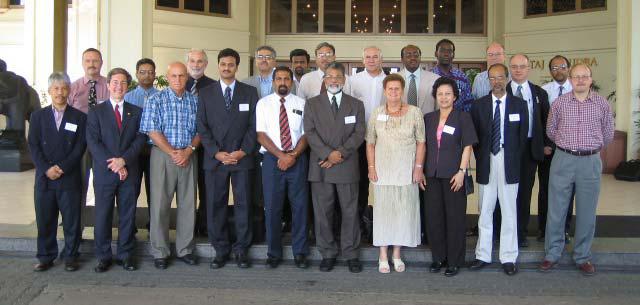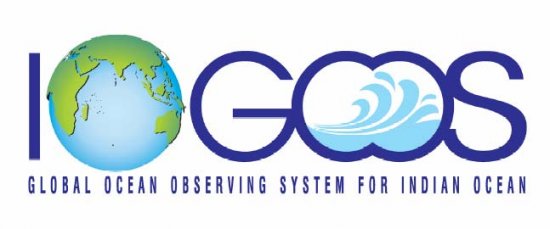ESSO - Indian National Centre for Ocean Information Services
(An Autonomous Body under the Ministry of Earth Sciences, Govt. of India)
Second Conference of The Indian Ocean Global Ocean Observing System(IOGOOS-II)
Colombo April 29, 2004
CONFERENCE STATEMENT
CONFERENCE STATEMENT
Over the last 18 months since its formal launch at the First Indian Ocean Conference held at Mauritius in November 2002, IOGOOS has taken a place of pride among the GOOS Regional Alliances. The membership of IOGOOS has grown from 19 to 21 institutions from 13 countries. IOGOOS has now been endorsed by the Intergovernmental Oceanographic Commission of UNESCO as one of the nine GOOS Regional Alliances.
The Second Annual meeting (IOGOOS II) held at Colombo during April 26-29, 2004 agreed on a detailed action plan and on the implementation of several initiatives.
IOGOOS is providing a focus for the region, developing cooperation and opportunities for synergy among members, and creating the ability to take advantage of global initiatives such as Global Ocean Data Assimilation Experiment (GODAE), Climate Variability and Predictability Programme (CLIVAR) and Argo. IOGOOS is playing an important regional role in terms of observations and associated research, using pilot projects and focussed initiatives to enhance the capacity and productivity of the region. It is facilitating regional cooperation with research programs such as CLIVAR and Land Ocean Interactions in the Coastal Zone (LOICZ).
IOGOOS has been instrumental in the formation of the Indian Ocean Panel (IOP) to address the ocean and climate observing system in the region. The first meeting of IOP held at Pune in February 2004 assessed the state of the observing networks. IOGOOS members have played a key role in Argo deployments and in enhancing the tropical moored buoy array. The IOP is operated jointly with CLIVAR and is providing an energetic and effective link to the climate research community. An implementation plan will be prepared during 2004-05, including extension of the mooring array, assessment and review of the ship of opportunity program, and initiating a series of observing system experiments.
The IOGOOS II meeting endorsed the recommendations of the IOGOOS Workshop held at Hyderabad in December 2003 and decided to create a Regional Data Centre at the Indian National Centre for Ocean Information Services (INCOIS), to provide a focus for data assembly and distribution activities. The Centre will also develop a clearinghouse for the region to allow members to efficiently and effectively exploit observations and products from the region. The delivery of key information to users will be expedited.
IOGOOS is working within the framework of the GOOS Coastal Panel and taking responsibility in collaboration with that Panel in the implementation of initiatives within the region, including contributions to the measurement of key common variables and testing of common methodologies.
The IOGOOS project on monitoring of keystone coastal ecosystems is directly addressing issues concerning degradation of seagrass beds, coral reefs and mangrove forests. It was recognized that a coherent and coordinated approach can deliver improved management policies and mitigate impacts. A draft proposal has been prepared based on the recommendations of the Census of Marine Life (CoML) Workshop held at Goa during December 2003 to ensure community participation in the measurement/monitoring of variability and change in these important ecosystems.
The IOGOOS prawn project is addressing the risks and opportunities facing the prawn industry and establishing a network and website, and pooling the expertise to gather observations and improve understanding of the issues.
IOGOOS is addressing issues of coastal change and developing a network of people and countries to examine shoreline position changes in a coherent and systematic way. A pilot project to be undertaken in Sri Lanka will interact with the broader GOOS community and demonstrate methodologies.
The IOGOOS II meeting recognised the urgent need for satellite products and associated capacity building, through all activities, and agreed to assist in the development of enhanced SST products as well as other products for the coastal and biological community.
The IOGOOS II meeting noted that the Secretariat at INCOIS, Hyderabad has been energetic, competent and proactive in supporting the activities of IOGOOS, in cooperation with the IOC Perth Office. With the support of the Department of Ocean Development, India the Secretariat has grown significantly supporting various activities such as data management. The Secretariat has developed an informative web site that is providing effective communication for the region
IOGOOS welcomed the international adoption of a data policy that will enhance the timely exchange and utility of observations. The meeting agreed to test the implementation of the IOC’s data policy and to demonstrate the advantages that accrue to the region from such an approach.
IOGOOS will give specific attention to enhancing the capacity of the region and developing a coherent education and training program.
The meeting, above all else, demonstrated that IOGOOS has developed a community spirit for the region, a “oneness” among all agencies and participants for the benefit of the entire region.
The meeting acknowledged the gracious financial support provided by the IOC for organising IOGOOS II. The meeting also thanked the Government of Sri Lanka for hosting and supporting the IOGOOS II through its National Aquatic Resources Research and Development Agency.




